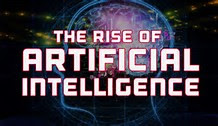Experts
have warned that rapidly improving artificial intelligence could lead to mass
unemployment just days after Google revealed the purchase of a
London based start-up dedicated to
developing this technology.
Speaking
on Radio for's Today program, Dr Stuart Armstrong from the Future of Humanity
Institute at the University of Oxford said that there was a risk that computers
could take over human jobs "at a faster rate than new jobs could be
generated." "We have some studies looking at to which jobs are the
most vulnerable and there are quite a lot of them in logistics, administration,
insurance underwriting," said Dr Armstrong.
"Ultimately,
huge swathe of jobs are potentially vulnerable to improved artificial
intelligence." Dr Murray Shanahan, a professor of cognitive robotics at
Imperial College London, agreed that improvements in
artificial intelligence were creating "short term issues that we all need to be talking about." "It's very difficult to predict," said Dr Shanahan.
artificial intelligence were creating "short term issues that we all need to be talking about." "It's very difficult to predict," said Dr Shanahan.
That
is, of course, a concern. But in the past when we have developed new kinds of
technologies then often they have created jobs at the same time as taking them
over. But it certainly is something we ought to be discussing.
Regardless
of how DeepMind's expertise will be used, Google's purchase of the company
underscores increasing fears over the impact of technology on employment.
write Frey
and Osborne. "In addition, advanced robots are gaining enhanced senses and
dexterity, allowing them to perform a broader scope of manual tasks. This is likely to change the
nature of work across industries and occupations." Unfortunately, it seems
that we can assume the same problems will also become rapidly apparent in the UK.
Although certain types of jobs are not yet
threatened (especially those which involve dealing with other humans – a vague
category that can cover anything from healthcare to management) this is no guarantee that they'll be safe
forever.














No comments:
Post a Comment